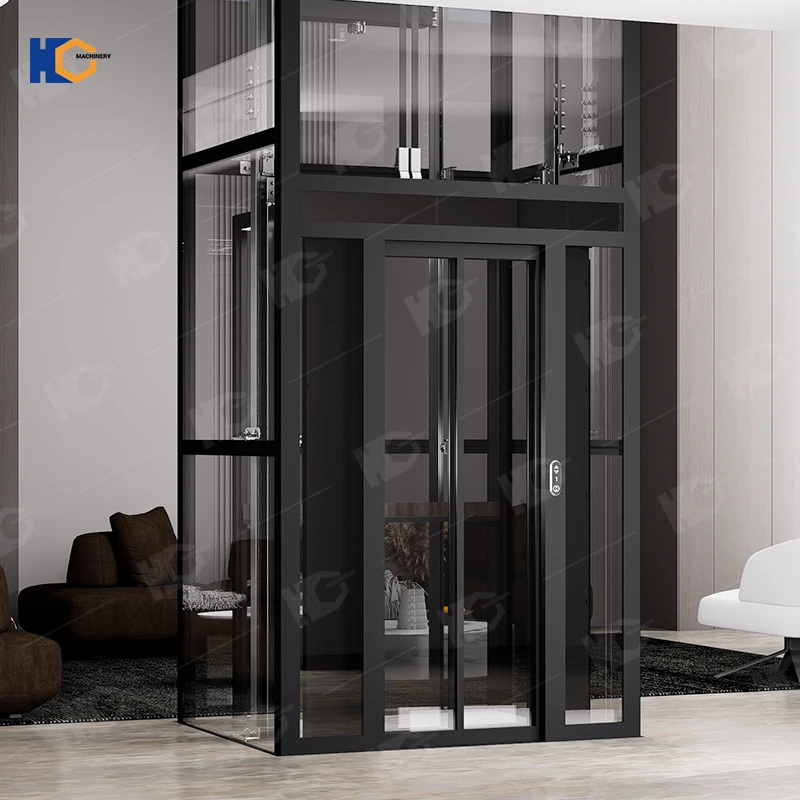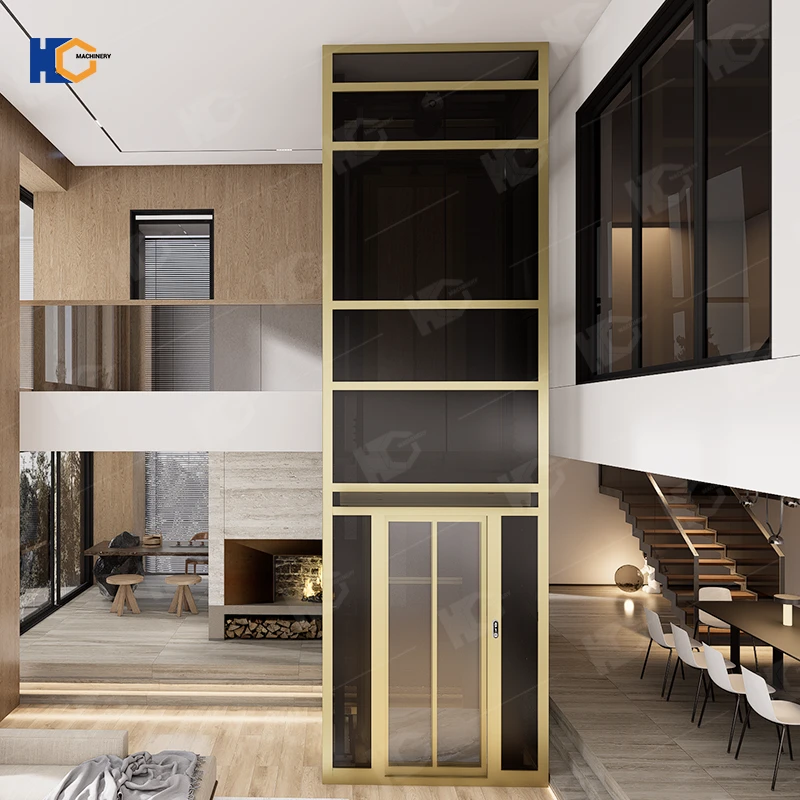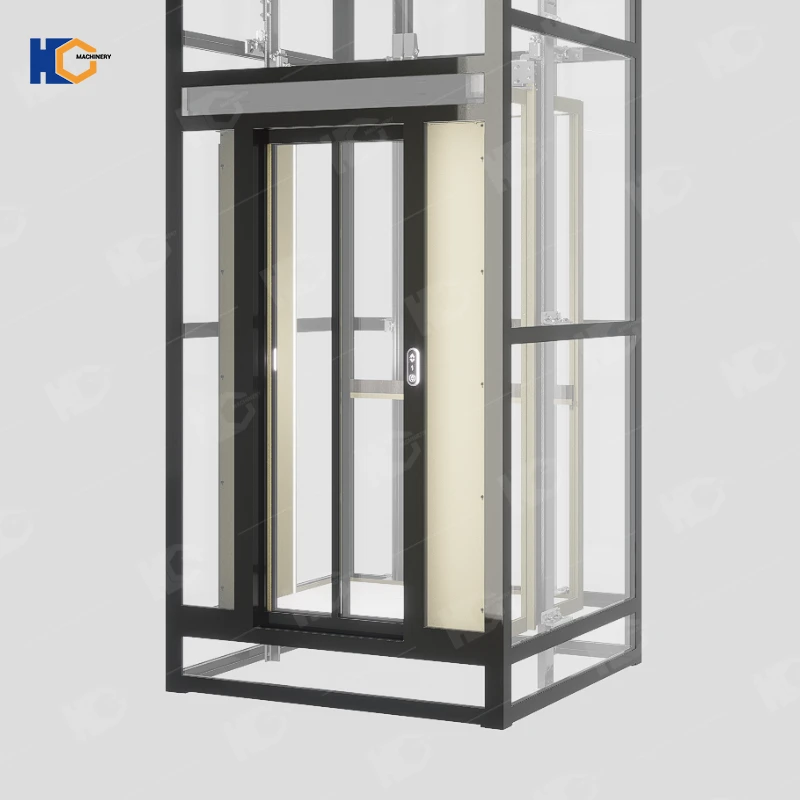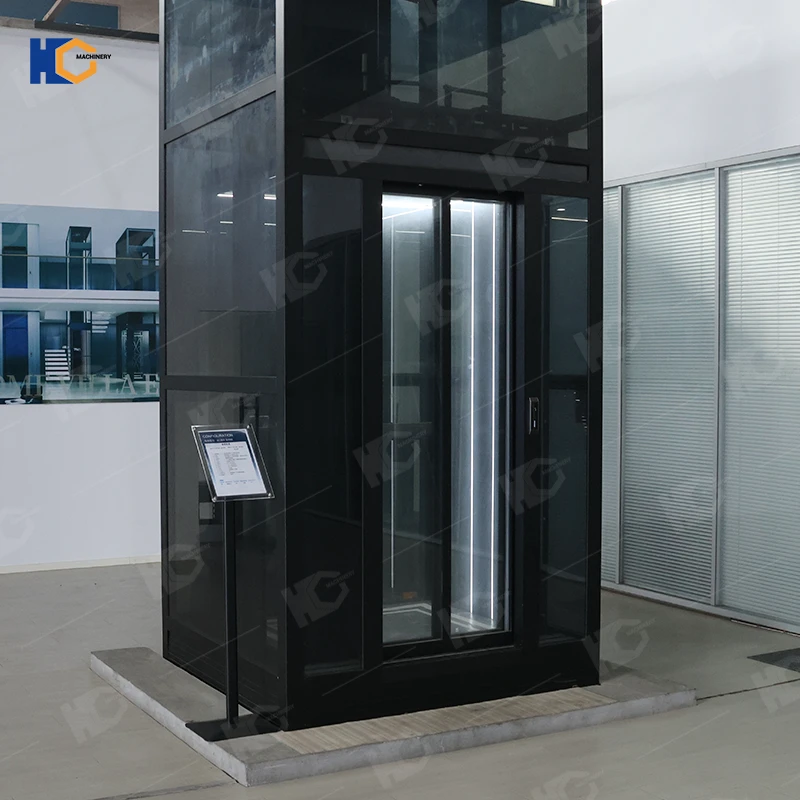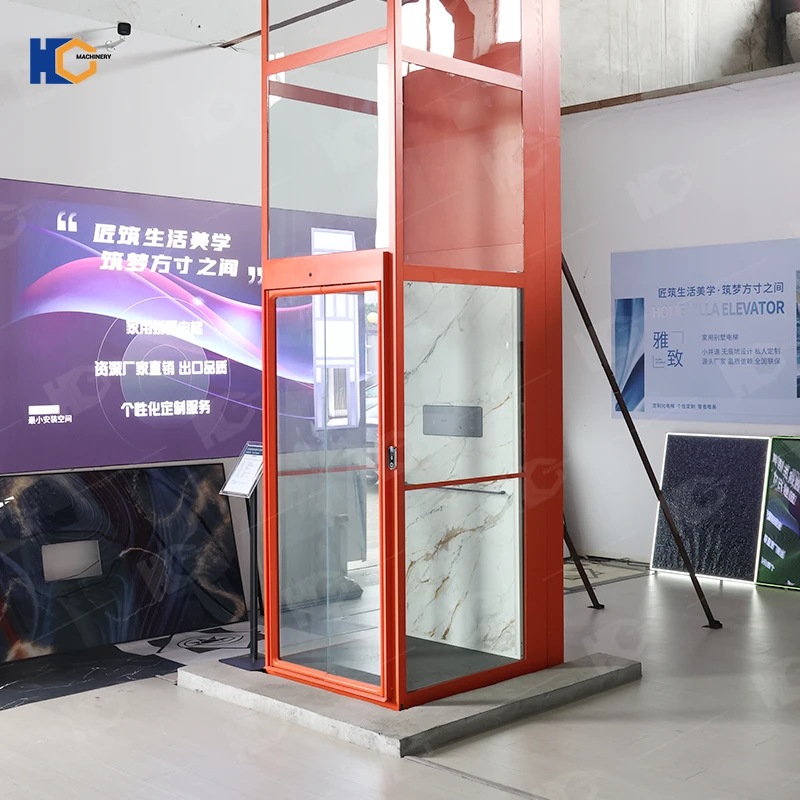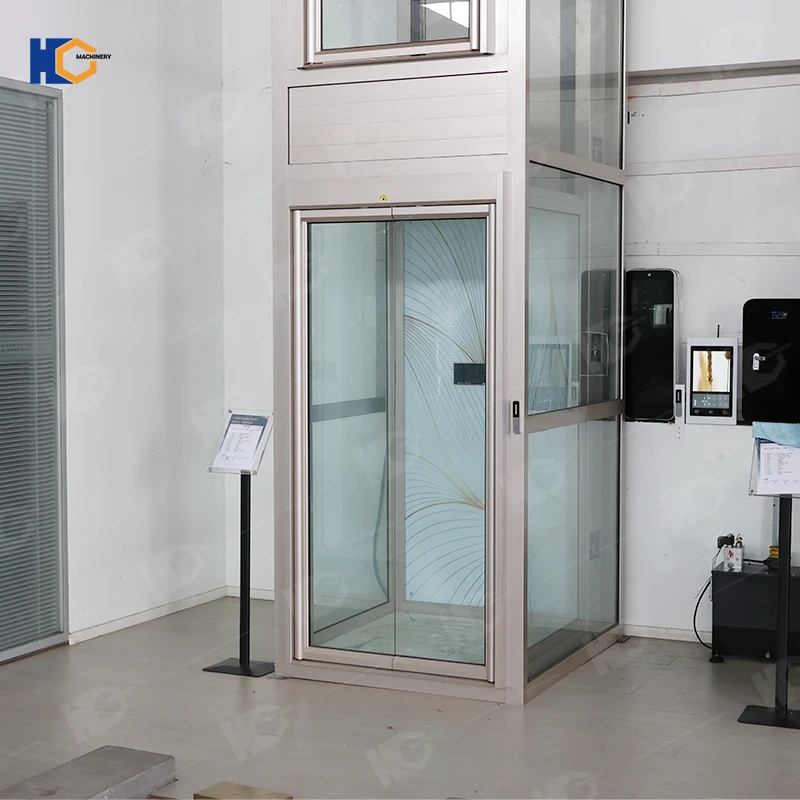Product Categories and Core Specifications
Kenya’s small home lift market primarily features three types: machine-room-less traction, hydraulic, and screw-type elevators. These models are tailored to local architectural and climatic requirements:
| Type | Capacity (kg) | Speed (m/s) | Shaft Size (Width × Depth) | Suitable Floors | Power Requirement |
|---|---|---|---|---|---|
| Machine-Room-Less Traction | 250–300 | 0.15 | 1.1m × 1.1m | 2–6 floors | 240V/50Hz, 10A |
| Hydraulic | 200–250 | 0.12 | 1.2m × 1.2m | 2–5 floors | 240V/50Hz, 16A |
| Screw-Type | 150–180 | 0.10 | 0.8m × 0.8m | 2–4 floors | 240V/50Hz, 8A |
Localized Adaptations:
Shaft Compatibility: Common residential shaft widths in Kenya range from 1.0–1.2m, with a depth of 1.1m (aligned with KEBS PS 1143:2020 standards).
Climate Adaptation: Motors and control panels must have IP54 moisture resistance to withstand coastal humidity.
Voltage Flexibility: Supports 240V ±10% fluctuations to adapt to Kenya’s unstable grid.
Customized solutions are available for specific requirements. Contact our factory for tailored specifications.
100073.webp)
Core Features and Technical Highlights
1. Basic Functions
Smart Call System: Supports floor buttons + mobile app control, with voice prompts (Swahili/English) on select models.
Energy-Saving Mode: Standby power consumption ≤15W. Hydraulic models include energy recovery systems, converting 90% of kinetic energy during braking into electricity.
Safety Redundancy: Three-level anti-fall protection (speed limiter + safety clamp + buffer) and 110% overload protection.
2. Specialized Adaptations
Weatherproof Control Panels: Sealed enclosures (IP65 rating) for coastal areas like Mombasa.
Solar Power Integration: Optional 500W solar panels + battery systems for off-grid homes.
Space-Saving Design: Screw-type elevators eliminate traditional machine rooms, saving 1.5㎡ for retrofits.
3. Smart Extensions
Remote Monitoring: SIM-based alerts for faults, with Nairobi service response under 4 hours.
Facial Recognition: High-end models feature infrared cameras for contactless calls (additional $800 software licensing).
Our factory has developed numerous functional extensions tailored to the Kenyan market. Contact us for the latest updates and customized solutions.
Application Scenarios and Demand Matching
1. High-Rise Residential Buildings
Challenge: Minimal shaft modifications in older buildings.
Recommended Model: Machine-room-less traction (250kg capacity, 0.15m/s speed), reducing shaft space by 30%.
Case Study: Yongda screw-type elevators installed in Lavington, Nairobi, completed in 7 days at $9,200/unit.
2. Accessible Housing
Challenge: Wheelchair platforms require ≥80cm × 80cm space.
Recommended Model: Hydraulic elevators (1.0m × 1.0m platform, 90cm door width) with electric leveling sensors.
Policy Support: Eligible for Kenya’s Accessibility Environment Act subsidies ($1,500/unit).
3. Commercial Villas
Challenge: Aesthetic integration with home décor (e.g., granite panels, LED lighting).
Recommended Model: Custom machine-room-less elevators with walnut wood finishes + champagne gold buttons; supports background music systems.
Cost Note: Custom designs increase prices by 25–30%.
Need a specialized solution? Contact us to align our products with your unique requirements.
686921.webp)
Overview of Kenya’s Small Home Lift Market
1. Demand Drivers
Cities like Nairobi and Mombasa are experiencing a construction boom in high-rise residential and commercial complexes. According to Kenya’s Ministry of Housing, 37% of buildings under construction in 2023 had 10 or more floors, driving surging demand for home lifts. Core drivers include:
Aging Population: The proportion of people aged 65+ exceeded 3%, making accessibility facilities mandatory in new residential builds.
Middle-Class Consumption Upgrade: Households earning over $50,000 annually account for 12%, pushing high-end residences to standardize elevator installations.
Policy Guidance: Kenya’s National Building Code mandates elevator shaft reservations for buildings with 5+ floors.
2. Market Player Landscape
International Brands: Hitachi, Otis, etc., target the premium market via local agents, offering machine-room-less elevators priced at 18,000–35,000.
Local Brands: Kenya Elevators, East African Lifts, etc., provide lightweight traction elevators at 8,000–15,000, relying on imported core components.
Chinese Brands: Yongda, Sunny, etc., dominate the mid-tier market with prices of 6,500–12,000, capturing 28% market share.
Price System Analysis of Small Home Lifts
1. Cost Structure
| Cost Item | Proportion | Local Adaptation Impact |
|---|---|---|
| Equipment Procurement | 45% | Import tariffs (15%) + VAT (16%) |
| Installation | 25% | Labor cost: $30/hour (Nairobi) |
| Maintenance Contracts | 15% | Annual maintenance: 5–8% of equipment cost |
| Other Costs | 15% | Shaft modification/transport insurance |
2. Mainstream Elevator Price Comparison
Machine-Room-Less Traction (300kg capacity, 0.15m/s speed):
Hitachi: $22,000 (inclusive of tax)
Locally assembled (Kenya): $11,500 (10-year warranty)
Hydraulic (250kg capacity, 0.1m/s speed):
Yongda (China): FOB 8,800→CIF12,200 (including shipping + 16% VAT)
Screw-Type (180kg capacity, space-saving):
European second-hand units: $5,500 (high risk: Kenya restricts second-hand elevator imports)
3. Exchange Rate Volatility
Current exchange rate: 1 USD ≈ 140 KES, but the central bank allows ±5% fluctuation. In 2023, the Kenyan shilling depreciated by 12% due to Fed rate hikes, effectively raising USD-denominated quotes. Recommend using hybrid pricing (USD + KES) to hedge risks.
988970.webp)
Procurement Guide for Bulk Buyers
1. Supplier Evaluation Model
| Criteria | Weight | Key Focus |
|---|---|---|
| Cost Control | 35% | Includes local installation/5-year warranty |
| Technical Fit | 30% | Shaft compatibility (typical 1.2m×1.2m) |
| Delivery Capability | 35% | Port clearance in Mombasa (14 days for China-made) |
2. Pricing Negotiation Strategies
Volume Discounts: 12–18% off for orders ≥10 units (requires bank guarantee).
Local Assembly Partnerships: Use CKD (Completely Knocked Down) imports to reduce tariffs from 15% to 5%, saving $1,800/unit.
Long-Term Contracts: Lock in USD prices for 3 years with annual caps ≤3%.
3. Risk Mitigation
Certification Barriers: Mandatory KEBS PS 1143:2020 certification to avoid delays.
Spare Parts: Require suppliers to stock 20% critical components (e.g., traction sheaves) in Nairobi warehouses.
Installation Qualifications: Prioritize EBC-certified teams to reduce inspection risks.
Market Trends and Procurement Advice
1. 2025 Price Forecast
Imported elevators to rise 8–10% due to USD strength.
Local assembly prices may drop 15%, but warranties could shorten to 5 years.
2. Bulk Procurement Golden Rules
Portfolio Strategy: 70% Chinese brands + 30% local assembly for cost-service balance.
Localized Customization: Request Kenya-specific features (e.g., weatherproof control panels, solar interfaces).
Localized Supply Chain: Establish warehouses in Mombasa Free Zone to stock spare parts.
3. Sustainability Opportunities
Kenya’s Green Building Initiative offers 15% tax breaks for energy-efficient elevators. Prioritize permanent magnet synchronous motor models, reducing long-term energy costs by 40%.
Conclusion: Precision Procurement Delivers Maximum Value
In Kenya, small home lift procurement requires balancing short-term costs with long-term operations. Bulk buyers should adopt a “price-service-risk” triad decision model, leveraging local assembly policies to cut costs while locking in suppliers via long-term agreements. Remember: Every 1,000savedinprocurementcostscouldgenerate5,000 in implicit operational benefits—this is Kenya’s survival rule for professional buyers.
713.webp)
